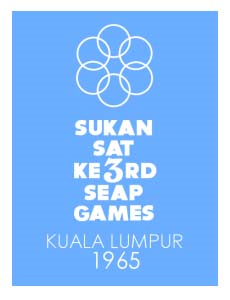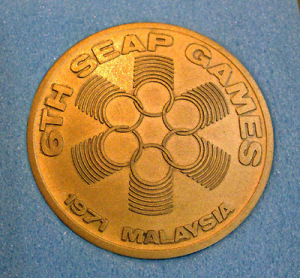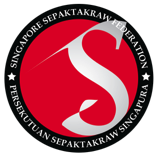
Sepak takraw, or Sepaktakraw, also called kick volleyball, is a team sport played with a ball made of rattan or synthetic plastic between two teams of two to four players on a court resembling a badminton court. It is similar to volleyball and footvolley in its use of a rattan ball and players using only their feet, knees, shoulders, chest and head to touch the ball. Sepak Takraw is often referred to as a mixture of volleyball, due to its use of a net, and association football, as players use their feet.

The 1965 Southeast Asian Peninsular Games, officially known as the 3rd Southeast Asian Peninsular Games, was a Southeast Asian multi-sport event held in Kuala Lumpur, Malaysia, from 14 to 21 December 1965 with 14 sports featured in the games. Originally to be hosted by Laos, the third edition of the games was hosted by Malaysia after the former was not able to honour its hosting commitment citing financial difficulties and would later known to have hosted the 2009 SEA Games decades later. Two years earlier, the third SEAP Games was cancelled as Cambodia pulled out of hosting the event due to internal strife. This was the first time Malaysia host the games. Malaysia is the third country to host the Southeast Asian Peninsular Games, which later known as the Southeast Asian Games after Thailand and Myanmar, then Burma. The games was opened and closed by Ismail Nasiruddin, the King of Malaysia at the Stadium Merdeka. The final medal tally was led by Thailand followed by host Malaysia and Singapore.

The 1967 Southeast Asian Peninsular Games, officially known as the 4th Southeast Asian Peninsular Games, was a Southeast Asian multi-sport event held in Bangkok, Thailand from 9 to 16 December 1967 with 16 sports featured in the games. Cambodia once again declined to host this edition of the games, as it did in 1963. This was Thailand's second time hosting the Southeast Asian Games, and its first time since the 1959 inaugural games. The games was opened and closed by Bhumibol Adulyadej, the King of Thailand at the Suphachalasai Stadium. The final medal tally was led by host Thailand, followed by Singapore and Malaysia.

The 1971 Southeast Asian Peninsular Games, officially known as the 6th Southeast Asian Peninsular Games, was a Southeast Asian multi-sport event held in Kuala Lumpur, Malaysia from 6 to 13 December 1971 with 15 sports featured in the games. In this edition of the games, host country Malaysia joined Singapore in pressuring Thailand to let the SEAP Games Federation expand to include the Philippines and Indonesia, but to no avail. Thai officials felt that such expansion would be contrary to the small family affair they had intended the games to be, and would not be in keeping with the close-neighbours spirit the games was supposed to cultivate. This was the second time Malaysia hosted the games and its first time since 1965. The games was opened and closed by Abdul Halim, the King of Malaysia at the Stadium Merdeka. The final medal tally was led by Thailand, followed by host Malaysia and Singapore.

The 1973 Southeast Asian Peninsular Games, officially known as the 7th Southeast Asian Peninsular Games, was a Southeast Asian multi-sport event held in Singapore from 1 to 8 September 1973 with 16 sports featured in the games. This was the first time Singapore hosted the games. Singapore is the fourth nation to host the Southeast Asian Games after Thailand, Burma and Malaysia. The games was opened and closed by Benjamin Sheares, the President of Singapore at the Singapore National Stadium. The final medal tally was led by Thailand, followed by host Singapore and Malaysia.

The 1977 Southeast Asian Games, officially known as the 9th Southeast Asian Games, was a Southeast Asian multi-sport event held in Kuala Lumpur, Malaysia from 19 to 26 November 1977. This was the third time Malaysia hosted the games and its first since 1971. Previously, it also hosted the games for the first time in 1965. Brunei, Indonesia, and the Philippines were finally admitted into the SEAP Games Federation in February that year. Although the word 'Peninsula' was omitted from the new federation title to reflect the expansion, in which the games is the first games to bear the name, its emblem, and the sequential numbering of the games was kept to provide continuity, as well as reverence to the objectives, aspirations and contributions of the founders. The six-ring emblem was not replaced until 1999, when the present ten-ring emblem was first used in an official games logo. The games was opened and closed by Yahya Petra, the King of Malaysia at the Stadium Merdeka. The final medal tally was led by Indonesia, followed by Thailand and the Philippines, with host Malaysia in fifth place.
The 1983 Southeast Asian Games, officially known as the 12th Southeast Asian Games, or informally Singapore 1983, was a Southeast Asian multi-sport event held in Singapore from 28 May to 6 June 1983. Scheduled to be hosted by Brunei in accordance to the renewed alphabetical rotation of hosting duties, the 1983 SEA Games were offered to be hosted by Singapore as Brunei prepared for its forthcoming independence from the United Kingdom. The games also marked the return of Cambodia, as People's Republic of Kampuchea after an 8-year-long absence since the Khmer Rouge seized power in 1975.

The 1993 Southeast Asian Games, officially known as the 17th Southeast Asian Games were held in Singapore from 12 to 19 June 1993 with 29 sports in 440 events featured in this edition. This was the third time Singapore hosted the games after 1983 and 1973 competition. It was opened by President Wee Kim Wee. The Games featured 29 sports in 440 events. The final medal tally was led by Indonesia.
Sports in Thailand play a significant role in Thai culture, with both participants and spectators engaging in a wide variety of activities. Muay Thai, a traditional martial art, is deeply ingrained in Thai history and has evolved into national sport. Aside from muay Thai, association football is the most popular sport in Thailand, followed by volleyball and badminton. There is also a diverse range of sports that are also popular throughout the country, including tennis, golf, swimming, athletics, cycling, motorsports, snooker, and sepak takraw, which is one of Thailand's two national sports along with muay Thai. Water sports such as scuba diving, kiteboarding, jet skiing, surfboarding, rafting, sea kayaking, windsurfing, wakeboarding, long boat racing, and long-tail boat racing are also popular among sports tourists and locals alike.
Sepak takraw was contested at the 2002 Asian Games in Busan, South Korea by both men and women, with all games taking place at Dongseo University Minseok Sports Center.

The 2015 Southeast Asian Games, officially known as the 28th Southeast Asian Games, or the 28th SEA Games, and commonly known as Singapore 2015, was a Southeast Asian multi-sport event held by the city-state of Singapore from 5 to 16 June 2015, It was the fourth time the country hosted the games. Singapore had previously also hosted the games in 1973, 1983 and the 1993 editions.

The International Sepaktakraw Federation, commonly known as ISTAF, is the international governing body for the sport of Sepak takraw, which was formed in 1988 with five founding member countries including Malaysia, Thailand, Singapore, Indonesia and Myanmar, officially based in Thailand and with its secretariat in Singapore. The current President is Major General Dr. Charouck Arirachakaran of Thailand. Its main goal currently is to spread Sepak takraw into 75 different countries and ultimately make it an Olympic sport by 2026. As of April 2020, the federation consists of about 50 member national associations, mostly in Asia-Oceania, 13 of which are on provisional status.

Singapore participated in the 2014 Asian Games in Incheon, South Korea from 19 September to 4 October 2014.
Sepak takraw at the 2014 Asian Games in Incheon was held from 20 September 2014 to 3 October 2014 at the Bucheon Gymnasium.
The men's double regu sepak takraw competition at the 2014 Asian Games in Incheon was held from 20 September to 22 September at the Bucheon Gymnasium.
Sepak takraw at the 2015 SEA Games was held at EXPO Hall 1, Singapore from 6 to 15 June 2015.
Sepak takraw at the 2018 Asian Games was held at Ranau Sports Hall, Palembang, Indonesia. It was held from 19 August to 1 September.

Singapore participated at the 2021 Southeast Asian Games held in Hanoi, Vietnam from 12 to 23 May 2022. The Games were postponed in 2021 due to the Covid-19 pandemic.

The Singapore Sepaktakraw Federation, is the national governing body for sepaktakraw in Singapore, founded in 1959 at Istana Kampong Glam, and was recognized as one of the community associations on 1999 by the government People's Association. The roles of the PERSES include organising the domestic competitions; the Premier League and the National League, which was established in 1991, promote and develop Sepaktakraw, locally and internationally, establish a long-term athlete development plan and develop a national curriculum for sepaktakraw, as well as a selection of players for the international competitions. In 2021, the PERSES also created the first female Sepaktakraw national team to compete at 2021 Southeast Asian Games in Vietnam.

Singapore has sent thousands of athletes to the celebration of the Southeast Asian Games over the decades, starting with the first edition in 1959 as a founding member. Since then, the country has sent athletes to every edition. The Singapore National Olympic Council (SNOC) is the National Olympic Committee for Singapore, which also oversees athletes going for the competition.










